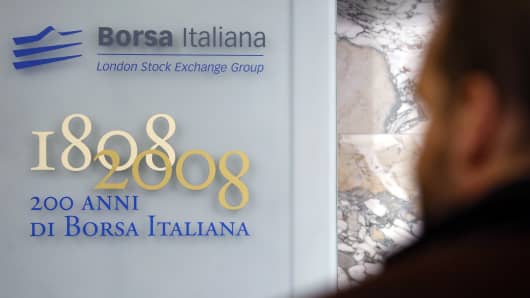The practice of short selling, betting that stock will fall to profit from the decline, has declined, according to research firm Markit, and this trend is much more pronounced in Europe than it is in the U.S.
"We've certainly seen that there's been less of an appetite to sell short," Simon Colvin, research analyst at Markit told CNBC.
"There's a lot of macro risk in the market right now and that's really driving a lot of this, and short sellers tend to be a bit more like stock pickers, so obviously when there's more uncertainty that tends to see short sellers cover (ending short positions)."
Short selling peaked in June 2012, according to Colvin, and has since dropped off by around 25 percent.
Markit's own data show that since the summer, Europe's Stoxx 600 Index has seen demand to borrow fall sharply to 2.3 percent of the total shares – close to the annual low of 2.2 percent in March.
One sector bucking that trend is Europe's technology hardware manufacturing sector, which sees an average of 8.8 percent of total shares on loan. In contrast the commercial and professional services sector saw the most short covering in recent months.
New rules installed on November 2 by the European Securities and Markets Authority (ESMA) mean anyone with short positions of greater than 0.2 percent in an EU company's shares must now report it to regulators.
(Read More: Short-Sellers of Europe Set to Be Unmasked)
Positions of more than 0.5 percent are also publicly disclosed and Colvin agreed that the decline could be driven by these new regulations as short sellers have increasingly come to see themselves as "activist investors".
Technology companies that have been on the receiving end of such short selling include Logitech, Aixtron and the mobile phone maker Nokia. According to Colvin it's the recent dominance of Apple and Samsung that have meant the shorts have targeted this sector.
"For example if we look at RIM (Research In Motion) - pretty heavily shorted. Nokia in Europe as well and that holds the same in Japan as well, we see a lot of the Japanese tech companies really struggling to compete and we see pretty high short selling in all of these names," he said.
(Read More: RIM Reports Loss but Beats Expectations; Shares Jump)
And it's not just European short sellers keeping checks on the tech sector as David Garrity at GVA Research told CNBC.
HTC, Nokia and Research in Motion saw share price rises in the second half of 2012 as rival Apple struggled after summer highs. Garrity, speaking before RIM released earnings on December 20, said he would put his money to work on the short side.
"I would argue that if we got to see decent numbers coming out of Apple in terms of acceptance of iPhone 5, obviously these gains in these stocks could be reversed fairly quickly," he said.
—By CNBC.com's Matt Clinch


